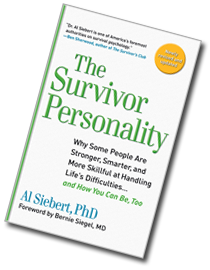Thriving During a Major, Long-Lasting Challenge
by Al Siebert, PhD
THRIVEnet Story of the Month - September 1995
To thrive means to find value and opportunity in events outside one's control. Jim Dyer had worked as a state employee for over 20 years when a new director was appointed to run his agency. At a meeting with agency managers, the director announced a reorganization plan. Jim saw that it would ruin years of good work by field office managers. Jim says, "I spoke up and asked a question about implementing the plan. The director glared at me. He got very angry. He said, 'Jim, your problem is you aren't a team player.'"
Three weeks later the administrator reassigned Jim to a different position. A month after that his position was transferred to a different department. A few months later he was reassigned to another office. A year after that he was transferred to a new position, then to another agency section, and so on.
What was Jim's reaction to each transfer? "I like people," he says. "I like doing things for people. Each morning I'd say to myself 'this is a fresh chance to do something for people.' Plus I had interests outside my job. I did not depend on my work for feelings of importance to others."
Jim learned each new position quickly and made himself useful. He enjoyed each new challenge and liked having a chance to learn about different offices and units. He says that after six years of being bounced from position to position, "a deputy director confided to me that the director of the agency had tried to get section heads to reduce me in grade or force me to quit, but they had not complied because they could never find grounds. I was always too capable and useful."
Jim's status began to increase. Because of the knowledge he had gained about the inner workings of many state agencies, he became a special trouble-shooter handling citizen's complaints. Then, two years before he retired, he got an unexpected reward. He says, "When the job classifiers looked at what I was doing, they jumped me three pay grades, from a 24 to a 27! And I didn't even give them all the documentation they usually need. I retired at a much higher grade than I expected!"
Jim Dyer's ability to effectively handle a situation at work that would have "stressed out" most people, is typical of life's best survivors. He thrived instead of reacting like a victim, or quitting or filing a stress disability claim. Jim's story shows that it isn't the situation, it is how you react to it that counts.
* From The Survivor Personality, by Al Siebert, pgs. 98-99. © 1996, Berkley/Perigee Books
